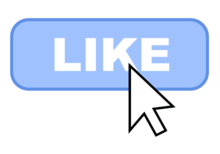The “Like” button is a feature commonly found on social media[1] platforms that allows users to express their appreciation or endorsement of a post, comment, or piece of content. Originating from platforms such as Facebook[2] and LinkedIn[4], the Like button has become a staple on numerous other social media platforms including Instagram[3], Snapchat[5], Twitter[6], Vimeo, FriendFeed, YouTube[7], Google[8]+, Reddit[9], VK, TikTok[10], XWiki, among others. The implementation and use of the Like button vary across these platforms, all with the shared goal of fostering user engagement and content visibility. Over time, the functionality of the Like button has evolved, with the introduction of reaction buttons, hiding like counts, and even the potential removal of the feature due to controversies surrounding its impact on mental health, privacy[11], and spread of misinformation. The Like button, while simple in design, plays a significant role in shaping online interactions and user behavior.
A like button, like option, or recommend button is a feature in communication software such as social networking services, Internet forums, news websites and blogs where the user can express that they like, enjoy or support certain content. Internet services that feature like buttons usually display the number of users who liked each content, and may show a full or partial list of them. This is a quantitative alternative to other methods of expressing reaction to content, like writing a reply text. Some websites also include a dislike button, so the user can either vote in favor, against or neutrally. Other websites include more complex web content voting systems. For example, five stars or reaction buttons to show a wider range of emotion to the content.
